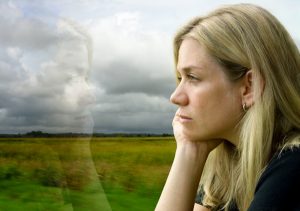Withholding: A Personal Story

To Withhold
Verb: 1. Refuse to give (something that is due to or desired by another)
2. Suppress or hold back (an emotion or reaction)
Are you sometimes aware of holding yourself back from being fully engaged in the experience of the moment? Do you find yourself avoiding activities that bring you pleasure or friends you enjoy spending time with? Do you have a hard time openly expressing your feelings to a loved one, often talking yourself out of how you feel, and then communicating accordingly, only to be frustrated with the end result? Can you relate to the expression “having one foot out the door?”
When I was 19, I embarked on a journey with the intention of traveling the globe by sea. This voyage symbolized an escape from the life I had lived as a child. I wanted out and never to return. Little did I know that whilst I would be visiting all corners of the earth, I would also take a long journey into myself that involved revisiting my childhood in order to begin to know who I was and how I came to be. It has been 20 years since and with the support of my family and friends, understanding the brilliant and necessary work of Robert Firestone and most recently, delving into Earnest Becker’s book The Denial of Death, I have come to fully appreciate, and have more compassion for, the horrific truth we as humans face.
From the moment we are brought into this world, we instinctively do what we have to in order to survive physically and emotionally. Like the fences we build around our homes and our countries to protect us from potential danger, we build psychological defenses around ourselves to protect us from what we fear. One of our strongest and most self-protective defenses is withholding. Not only do we withhold from others, but we withhold from ourselves as well.
As newborns, we are truly helpless yet maintain the illusion that we have magical powers. After all, we cry when we are hungry and food magically appears. We’re wet and uncomfortable, but with our screaming demands we are changed and comfort is restored. We point, and our needs are met. As we get a little older and start to acquire our own freedom and movement, we realize that we are not so powerful and almighty; in fact it’s quite the opposite. Our natural curiosity about our surroundings and ourselves is intruded upon with rules and order. To quote Earnest Becker, “Children feel hounded by symbols they don’t understand the need of, verbal demands that seem picayune, and rules and codes that call them away from their pleasure in the straightforward expression of their natural energies.” As our instinctual selves would have it, we would freely explore our curiosities like the hound dog follows his nose. We would allow feelings to surface without hesitation, as naturally as the sun and moon rise and set. We would never withhold our true nature from others or ourselves. But because we do what we have to in order to survive, we find ourselves fitting into a social structure. It’s a lifelong process of monitoring our actions accordingly.
Thus our symbolic self is born into the social structure of the family and society at large. This is where “good and bad” exists. If we don’t conform and fit neatly into what is socially acceptable, we fear being alone, outcast, different, and ultimately even being killed. This fear originated early on with the realization that our magical powers did not exist and were in fact an illusion. Our caretakers were the ones who possessed all the power and strength and were we not to comply with their beliefs, our very vulnerable existence could be threatened. It also dawned on us that our life is a time sensitive endeavor and that at the end of our time we will die, we will disappear into nothingness, never again to be, to taste, to touch, to smell, to feel; the hardest truth to ever know. So we protect our survival to the best of our ability in every way possible. Ironically the submission into the social structure becomes a safe haven. And if and when we find ourselves free of it, often the freedom is too much for our frightened selves to handle.
I remember, not too long ago, realizing that I was living with one foot out the door in regards to a long-standing, intimate relationship. Steve and I fell in love 20 years ago. The first two years were wonderful; I was happier than I had ever been before. We were equals sharing our newfound life. How he felt meant the world to me. How I felt meant the world to him. I opened up and let everything show. My true self was emerging from the depths of my childhood social structure. I felt free, I felt alive! But it was exactly that which frightened me. So we took the ride that most relationships endure: the usual ups and downs, and in’s and out’s. But it was the out’s that has brought me to where I am today. I began to wonder, why did I need that out? What was I holding out for? What does it mean to be all in? Here was a man I considered to be a good person, considerate of my feelings, kind and generous (a trait he mastered by working on himself which I value greatly). In spite of all of this, I wasn’t fully engaged in sharing life with him.
I came to realize that when I became closer and more vulnerable with Steve, when my true self became more apparent to me, I became consciously aware that I greatly valued my life. At that point, I also became cognizant that ultimately I would lose it all, and that was too much to bear. So, unconsciously, I took refuge by withholding what initially brought me so much joy and happiness. I toned it down to a bearable place of less importance. I needed to be in control and, at times, still feel that need (it’s a work in progress). I can truly say, after much self-reflection, that in my case it is one sided. Steve is pretty much always open and available to me but it has typically been my control that determines our closeness, our romantic behavior, when we have sex or when I felt like considering his feelings. I have safely held him at a distance while staying in the relationship. There are times when I’ve even had fantasies about the knight that would step out of that fairy tale and take me to a better place. I’ve had opportunities, but the truth is, the fantasy is only appealing because the reality of our human existence is hard no matter where we are or whom we’re with. In recognizing all of this, I decided to step into my life with the other foot. To fully engage in it, to challenge my defenses and not suppress the feelings I feel. To be vulnerable and risk everything to be authentic, because at the end of the day, all I have is me, and this is the only opportunity I’ll get to know who I truly am.
Tags: defenses, differentiation, psychological defenses, withholding







Such a touching personal story. I am sure a lot of people could benefit from your vulnerability in sharing this.
This is an inspiring article. It is exciting to come across something that affects ones life so profoundly yet in the deepest sense we are unaware. I found Naomi to be insightful and brave to tell her story and feel that this insight will positively affect my life experience. Thank you.
Incredible story – explains simply and personally a situation that keeps us from living our lives fully
This story not only touched me but also inspired me to really invest in my life fully and not hold back. Thank you for sharing such a personal and meaningful insight.
I appreciate how articulate and clear this blog is.. thanks Naomi, I have shared this on my social and personal network..
thanks for sharing such a personal story
I relate deeply to Naomi’s story and find that it explains so much of what happens in a relationship typically and what has happened in my life. It takes a great deal of insight to understand why a relationship goes off tract; it takes even more courage to “right” it again. I am thankful to Naomi for her personal story.
This is a great post.
I am currently going through this journey, but unfortunately only realised it once I got ‘out’.
Being able to work through this with someone who you love is a great thing.
A moving article: I’m in a similar situation. My wife has suddenly distanced her self from me. She talks about the 25 years preceding the change were not really her and that she is a different person, now. I feel that she has faced a mortality crisis sue some serious health issues, and wants to withdraw from life. When confronted with the changes she says the I bullied her for l those years. While not a perfect man or husband I find this perplexing and frightening. We now argue. She gives me the silent treatment and often doesn’t acknowledge my presence when I enter a room. When I ask her about this she says we should be comfortable with silence and it’s not her responsibility to entertain me . I feel miserable much of the time, now. I don’t know shat to do.,..